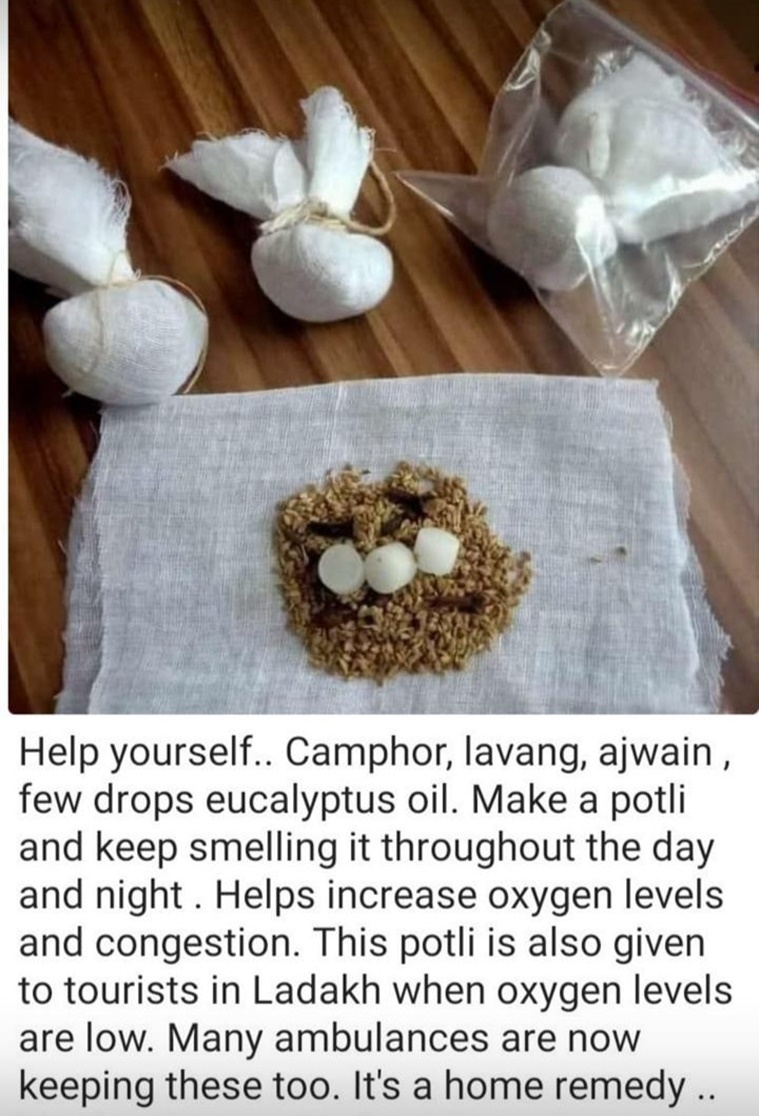- India
- International
COVID 19: Experts on whether camphor helps improve oxygen levels, relieve respiratory distress
"Camphor is a naturally occurring essential oil (volatile oil). Historically, it has been claimed that camphor was mentioned by Marco Polo in the 13th century and Camoens in 1571, who called it the 'balsam of disease'"
 The scientific impact of camphor is still not known. (Source: Getty Images/Thinkstock)
The scientific impact of camphor is still not known. (Source: Getty Images/Thinkstock)Among the many ‘social media’ solutions for the various symptoms of Covid-19 is the use of camphor or kapur. Many people on social media have been claiming that the aromatic organic compound can help improve oxygen levels in people with Covid-19.
Union Minister of Minority Affairs Mukhtar Abbas Naqvi also shared the same in a now-deleted post on Facebook. According to the post, “Camphor, lavang (clove), ajwain, few drops eucalyptus oil can help improve oxygen levels. “Make a potli (ingredients wrapped together in a cloth) and keep smelling it throughout the day. This helps increase oxygen levels and congestion. This potli is given to tourists in Ladakh when oxygen levels are low. It’s a home remedy,” he said.
To know more about the same, indianexpress.com reached out to a panel of experts.
 The post was shared by Union Minister Mukhtar Abbas Naqvi on her Facebook. (Source: Mukhtar Abbas Naqvi/Facebook)
The post was shared by Union Minister Mukhtar Abbas Naqvi on her Facebook. (Source: Mukhtar Abbas Naqvi/Facebook)
A brief history of camphor
Camphor is a waxy, flammable substance that has a strong aroma. According to researchers Young-Jin SUE MD, Heidi Pinkert MD, a study published in Haddad and Winchester’s Clinical Management of Poisoning and Drug Overdose (Fourth Edition), 2007 said that camphor was one of the therapeutic agents of the 19th-century pharmacopoeia used as an analgesic, expectorant, counterirritant, and abortifacient, as well as a stimulant.

“Camphor is a naturally occurring essential oil (volatile oil). Historically, it has been claimed that camphor was mentioned by Marco Polo in the 13th century and Camoens in 1571, who called it the ‘balsam of disease’. Camphor is highly prized by the Chinese, who used it for embalming purposes and to scent soap,” it mentioned.
As per the above research, In 1983, the US Food and Drug Administration ruled that over-the-counter products cannot contain camphor in excess of 11 per cent. In 1994, the American Academy of Pediatrics recommended the removal of camphor from all medicinal products. “However, despite these efforts, camphor continues to be ubiquitous in over-the-counter preparations such as local anesthetics, antipruritics, rubefacients, antitussives, “chest cold” inhalants, and some herbal products despite a lack of therapeutic value and the availability of safer alternatives,” it mentioned.
So, does camphor help relieve respiratory distress and ‘improve oxygen levels’?
Despite the varied historical uses of camphor, there is no evidence to prove that inhaling it can help one improve oxygen levels or relieve respiratory distress, said doctors.
“Camphor does not improve oxygen levels. It can give a soothing, comforting effect in patients suffering from respiratory illnesses to some extent, but does not increase the oxygen levels,” said Dr Tushar Rane, internal medicine expert, Apollo Spectra Hospital Mumbai.
Since the scientific impact of camphor is “still not known”, Dr Rane cautioned against blindly following social media advice. “It is a myth and there is no concrete evidence available regarding the benefits of camphor when it comes to improving oxygenation. Likewise, there is no study as well to back this claim. The logic behind smelling the camphor is ensuring that your sense of smell is intact and it opens up one’s nasal pathway. Do not follow any forwards on social media without your doctor’s advice. Trying home remedies can be fatal sometimes. The scientific impact of camphor is still not known,” he said.
 Here’s what to keep in mind. (Source: Getty Images/Thinkstock)
Here’s what to keep in mind. (Source: Getty Images/Thinkstock)
Agreed Dr Satish Kaul, HOD and director, internal medicine, Narayana Hospital, Gurugram, and said how the “grip of misinformation and myths is just adding to the challenges faced right now”. “Inhaling camphor does nothing good with one’s oxygen level; rather it may cause nose and throat irritation. Also, there is no scientific proof to confirm its efficacy as far as increasing oxygen level is concerned. People are requested to act wisely and seek doctor’s advice without delay instead of going for any traditional methods,” Dr Kaul told indianexpress.com.
As per Meyler’s Side Effects of Drugs, 16th edition published in The International Encyclopedia of Adverse Drug Reactions and Interactions, 2016, camphor has been used as a “substance of abuse” for many centuries, both by ingestion and by inhalation. “Today it is found in many non-prescription vaporised or topical “cold cures,” topical musculoskeletal anesthetic rubs, “cold sore” formulations, sunscreens, and mothballs. It has also been used to procure an abortion,” it stated.
Dr Samudrika Patil, CEO, Vedicure Healthcare and Wellness LLP said, “It can help with reducing pain if you rub topically on the skin but it does not increase oxygen levels. However, too much camphor inhalation can cause poisoning that could lead to seizures, mental confusion.”
As per researchers HL Rivera and F Barrueto’s study published in Encyclopedia of Toxicology (third edition), 2014, it is primarily a neurotoxin with a chemical structure that allows easy penetration of the blood–brain barrier. “Camphor also has irritant properties to skin and mucosa and ingestion of large amounts causes vomiting and diarrhea,” it read.
For more lifestyle news, follow us: Twitter: lifestyle_ie | Facebook: IE Lifestyle | Instagram: ie_lifestyle
Must Read
May 11: Latest News
- 01
- 02
- 03
- 04
- 05
























